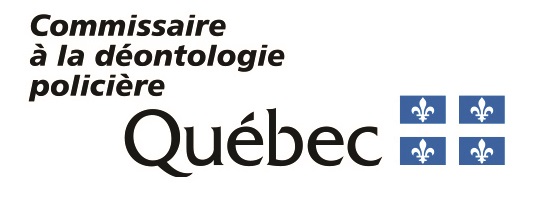File a complaint
Can We Handle Your Complaint?
Can We Handle Your Complaint?
Who?
Anyone can file a police ethics complaint :
- Person directly involved. Anyone who is involved in an event during which a police officer or other peace officer allegedly failed in its duty.
- Representative of a person involved. Any person who represents the person involved in an event during which a police officer or any other peace officer allegedly failed in its duty.
- Direct witness to an event. Any witness to an event during which a police officer or any other peace officer allegedly failed in its duty.
- Indirect witness to an event. Any other person who have been informed by a person or by the media (traditional or social) of an event during which a police officer or any other peace officer allegedly failed in its duty.
How?
Your complaint must be made in writing. Consult the section How to file a complaint? for more information on this.
When?
Your complaint must be filed no later than one year after the date of the event or your knowledge of the event.
Against Whom?
Your complaint must target one of the following persons subject to the Code of Ethics of Québec Police Officers, whether active or not:
- A Quebec police officer exercising their duties in Quebec;
- A Quebec police officer who performs their duties in another province or territory of Canada;
- A police officer from another province or territory who is authorized to perform their duties in Quebec;
- A wildlife protection officer;
- A special constable (e.g. courthouse, STM, SPCA, Hydro-Québec);
- A road controller (SAAQ);
- An investigator from the Unité permanente anti-corruption (UPAC);
- An investigator from the Bureau des enquêtes indépendantes (BEI).
Persons not subject to the Code of Ethics of Québec Police Officers
We cannot handle your complaint if it involves civilian police personnel such as 911 dispatchers, correctional officers, Royal Canadian Mounted Police officers or private security guards.
What?
Your complaint must be about actions, inactions or spoken or unspoken words that occurred in the performance of police duties and that do not comply with the Code of Ethics of Québec Police Officers.
It states that anyone subject to the Code must:
- behave in such a way as to maintain the trust and consideration required by their position.
- avoid any form of abuse of authority in its dealings with the public.
- respect the authority of the law and the courts and cooperate in the administration of justice.
- perform its duties with probity.
- perform its duties with impartiality and avoid placing themselves in a situation where they would be in a conflict of interest that could compromise its impartiality or adversely affect its judgment and loyalty.
- respect the rights of anyone in their care and avoid showing them complacency.
- use a weapon and any other piece of equipment with caution and discernment.
For What?
Not everyone is aiming for the same objective when they file a police ethics complaint. Some of these objectives are possible and probable, others are possible only in certain circumstances and others are impossible since the Commissaire à la déontologie policière does not have the power to achieve them.
Possible and Probable
- Awareness or training. If you would like the people concerned by your complaint to receive training on the right ways to act so that they can correct their behavior, we have the power to provide them with observations on their conduct and to make recommendations to their employer to prevent future breaches. In addition, you have the opportunity to educate the people concerned by your complaint yourself when you take part in a conciliation meeting.
- Discussion. If you want to discuss the event with the people affected by your complaint, tell them the impact their actions had on you and try to understand why they acted the way they did, the conciliation meeting allows you to get this result.
Possible in Some Circumstances Only
-
Apologies. We do not have the power to demand that the persons concerned by your complaint give you an apology. However, in a conciliation meeting, you could discuss the event with them, tell them the impact their actions had on you, and try to understand why they acted the way they did.
-
Sanction. After investigation (which is an exceptional measure reserved for more serious breaches), the Commissioner may summon one or more police officers or peace officers to appear before the Comité de déontologie policière. You can consult the page on citations in police ethics to read examples of complaints that were the subject of a citation before the Comité de déontologie policière and which led to a sanction.
Impossible
- Monetary compensation. We have no authority to compensate you for what you have suffered in connection with the incident.
- Dismissal of a ticket or a criminal charge. We do not have the power to cancel a ticket or a criminal charge. You must challenge the ticket or defend yourself from a criminal charge in court in order to obtain this result.
File a complaint
Need help?
If you want more information or if you need help drafting your complaint, you can contact us.
deontologie-policiere.quebec@msp.gouv.qc.ca
